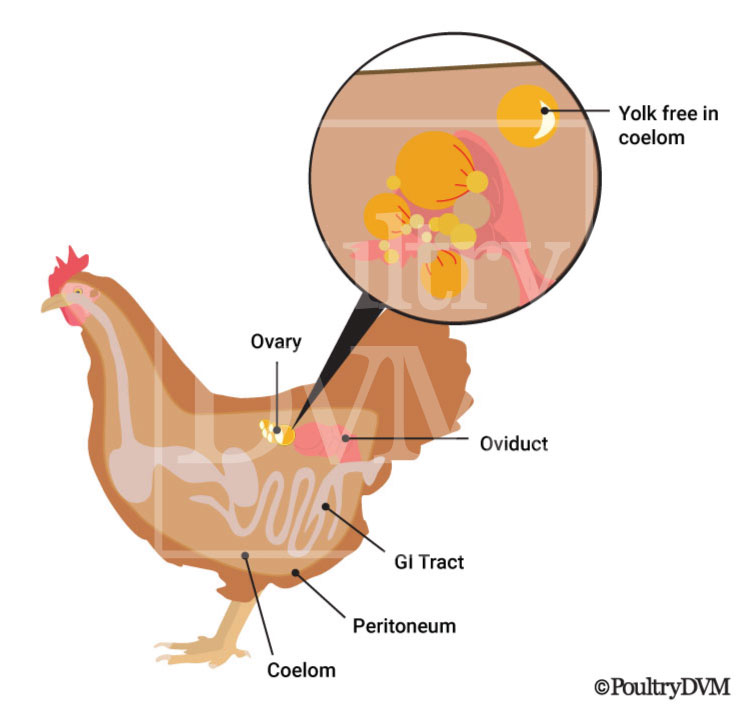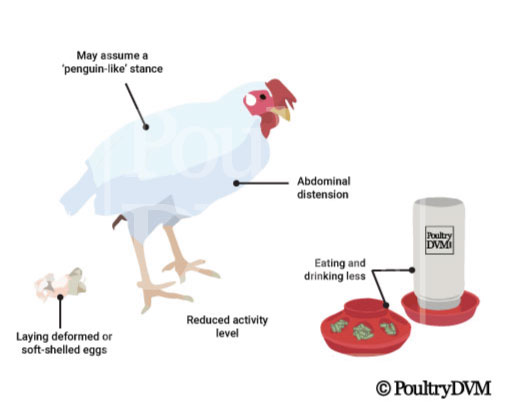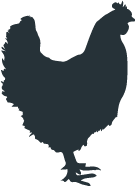Egg yolk peritonitis, also referred to as egg-related coelomitis, is a general term used to describe peritonitis associated with the presence of yolk material, usually caused by conditions such as ectopic ovulation (the follicle ruptures and the egg does not enter normally in the oviduct) or oviductal disease.
When yolk is present free within the intestinal peritoneal cavity, it can cause a massive localized inflammatory reaction, resulting in accumulation of free fluid, blood, and inflammatory cells. Additionally, since yolk material is an excellent growth medium for bacteria, it can lead to a secondary bacterial infection.
Escherichia coli is the most frequent bacteria isolated from affected birds. Other common types of bacterial organisms that have been isolated include
Klebsiella spp, Proteous sp[, Staphylococcus spp and
Streptococcus spp.
In cases of egg yolk peritonitis, it's important to determine the underlying cause, since it often occurs as a secondary or concurrent event to several reproductive conditions, including:
Signs of Egg Yolk Peritonitis in Hens
Hens with egg yolk peritonitis will usually stop laying as many eggs as possible, if they continue laying any at all. The eggs that they do lay are often consistently soft-shelled, thin-shelled, or have some deformity.
Hens with egg yolk peritonitis will be less active and may spend an excessive amount of time sitting in the nestbox, not because they're laying an egg. For this reason, these hens may sometimes be mistaken for being
"broody", which is a maternal behavior exhibited by hens who want to hatch a clutch of eggs. In the advanced stages, there may be palpable abdominal distension, indicating the presence of fluid inside the bird's abdomen (also known as ascites). These hens will often position themselves in a "penguin-like" stance in an attempt to help relieve some of the discomfort. They may also have difficulty breathing.
Diagnosis of Egg Yolk Peritonitis
Egg yolk peritonitis is diagnosed through a combination of history, clinical signs, physical exam, and a variety of diagnostic imaging equipment and laboratory tests. Tests that can be beneficial to help in the diagnosis of egg yolk peritonitis in chickens include:
- Physical Exam: Palpation of the abdomen can sometimes reveal the presence of soft-shelled or firm shelled eggs in the oviduct, ectopic eggs free within the abdomen, ovarian masses, or displacement of the ventriculus.
- Complete Blood Count (CBC): A blood test, called a complete blood count (CBC), measures the white blood cell count. A high white blood cell count usually signals inflammation or infection. A blood culture can help to identify the bacteria causing the infection or inflammation. Antibiotic sensitivity testing helps to identify the best antibiotic to use to treat the infection.
- Abdominal Fluid Cytology & Culture: The fluid recovered from an abdominocentesis (a procedure your veterinarian can perform using a needle, to remove any abdominal fluid present) is sent to a diagnostic laboratory for further testing.
- Radiography and ultrasound: May help in revealing the presence of accumulated egg material and space-occupying lesions.
Treatment of Egg Yolk Peritonitis
Treatment of egg yolk peritonitis varies depending on the cause and severity of clinical signs in the bird. Mild cases where no secondary bacterial infection is involved may only require supportive care. In other cases, when an infection is present, usually treatment requires a combination of analgesics, anti-inflammatories, broad-spectrum antibiotics, aggressive supportive care, and other therapies aimed at reducing egg laying activity. Surgery may sometimes be needed, to remove excessive accumulations in egg material.
If peritonitis is persistent or recurrent, additional diagnostics such as laparoscopy and surgical exploratory should be considered, as well as more aggressive treatment measures such as salpingohysterectomy.


